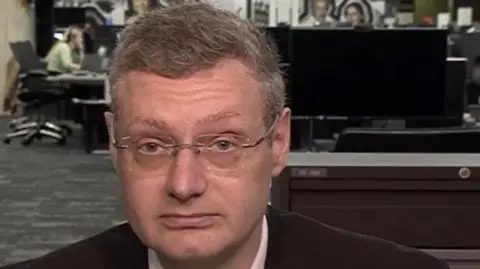Police drop demand for journalist's photos of riots
 BBC
BBCA photojournalist who refused to hand over images of rioters to police said he was "extremely relieved" the "flawed and dangerous" demand had been dropped.
South Yorkshire Police had considered forcing freelancer Joel Goodman to disclose photos he took of disorder outside an asylum hotel in Rotherham by applying for a court order.
Mr Goodman, who refused on the basis of preserving media freedom, said the force's demand would have exposed him and fellow journalists to "increased danger at work".
A police spokeswoman said their investigation into the riot "no longer necessitates" pursuing the journalist, who is based in north-west England, for the images.
The force wanted the photos to identify those in a mob that forced entry to a Holiday Inn during the wave of disorder that broke out in towns and cities across the UK in summer.
Journalists can be forced to disclose material in some circumstances under criminal evidence laws which require police to apply to a judge for a production order.
"I am extremely relieved to learn that this is over," Mr Goodman said.
'Defending the principle'
Police persisted for more than three months despite objections insisting the demand would hamper the ability of journalists to work freely, Mr Goodman said.
He said the force eventually acknowledged "they did not have grounds under the Police and Criminal Evidence Act to pursue any court order against me".
South Yorkshire Police "remains of the view that the process remains a lawful option" despite dropping the demand, a force spokeswoman said.
Some of the rioters pictured in published images of the riot have been convicted or were being processed through the courts, she added.
Officers have concluded that other shots of masked men were "highly unlikely" to reveal their identities, she said.
Mr Goodman said police had refused to accept responsibility for his legal costs, which he would not have incurred "had it not been for their threats".
The photojournalist said he would not have been able to prevent police from going to court without the legal support of not-for-profit organisation the Good Law Project.
"Defending this principle should not have been about my ability to pay my lawyers," he said.
"It is essential that the UK does not slide towards a place in which police can use their institutional and financial power to bully and force us to serve as unmarked evidence gatherers."
Augustina Olivieri of the Good Law Project said the organisation was proud to support Mr Goodman, "who stood up for all journalists" by refusing to back down.
Listen to the best of BBC Radio Manchester on Sounds and follow BBC Manchester on Facebook, X, and Instagram. You can also send story ideas to [email protected] and via Whatsapp to 0808 100 2230.
